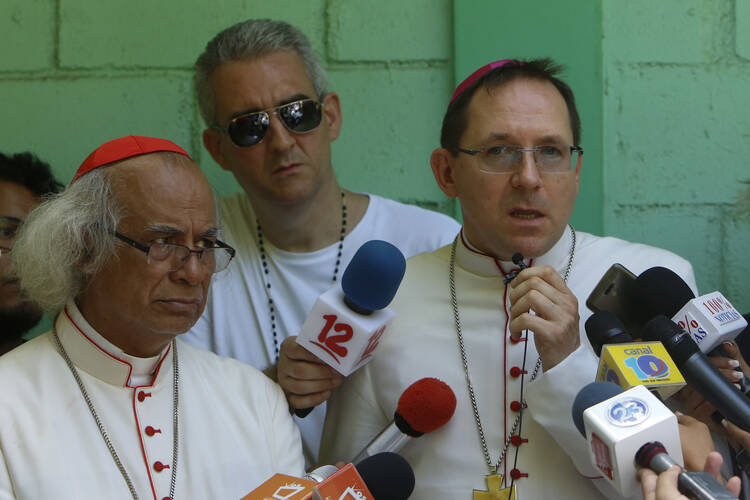MEXICO CITY (AP) — The Vatican on Saturday expressed “surprise and pain” at Nicaragua's expulsion of the papal nuncio, which comes at a time of growing pressure on opposition figures in the Central American nation.
The church said in a statement that Nicaragua's action against Polish Msgr. Waldemar Stanislaw Sommertag was “grave and unjustified.”
It said the action was “incomprehensible” because Sommertag “has worked tirelessly for the good of the church and of the Nicaraguan people,” while “always seeking to promote good relations” between the Vatican and Nicaraguan authorities.
It noted he had functioned as a formal witness during government talks with the opposition.
The Vatican office in Nicaragua's capital, Managua, announced on Monday that Sommertag had left the country on March 6, though it did not say why. His place was taken by the chargé d' affaires, Msgr. Marcel Mbaye Diouf.
The government has made no statement about the nuncio's departure.
The church said in a statement that Nicaragua's action against Polish Msgr. Waldemar Stanislaw Sommertag was “grave and unjustified.”
Sommertag arrived in Managua in 2018 in the midst of a wave of protests against the government of President Daniel Ortega. At least 328 people were killed, 2,000 wounded, hundreds detained and 88,000 fled into exile, according to the Inter-American Commission on Human Rights.
Ortega had tried to maintain cordial relations with the Roman Catholic Church in years before the protests, but those ties increasingly soured in the aftermath.
The nuncio participated in efforts to mediate in the conflict and win the release of detained opposition figures.
At the end of last year, relatives of 46 detained opposition figures had asked Sommertag to intercede with Ortega, though nothing came of the effort.
In a November interview with The Associated Press, Sommertag said his office had not received a formal request to intervene, but said it had worked “in favor of the most vulnerable, among those detainees of all categories, including political.”
“I think intercession is more than just and necessary ...," he said. “But in the end, we know very well that things depend on the government.”
Ortega's government increased its crackdown on opposition leaders ahead of last year's presidential elections, arresting potential candidates against him as well as several dozen prominent journalists, leaders of nongovernmental organizations and other critics.
On Friday, a judge convicted journalist Cristiana Chamorro, a potential presidential contender and daughter of former President Violeta Chamorro — who had defeated Ortega in a 1990 election — of money laundering and other crimes.
The news site Confidencial, run by Cristiana Chamorro’s brother Carlos Fernando Chamorro, reported that she, two members of her mother’s foundation, a driver, as well as a former lawmaker and other Chamorro sibling Pedro Joaquín Chamorro were all convicted Friday at the conclusion of a seven-day trial.
Ortega has targeted nongovernmental organizations in Nicaragua, cutting off their foreign funding, seizing their offices and canceling their charters. He has alleged they worked with foreign interests that wanted to see him removed from office.
Cristiana Chamorro, 68, had previously served as editor of La Prensa, Nicaragua’s largest newspaper. Her father, Pedro Joaquín Chamorro, had been its editor until his murder in 1978.








